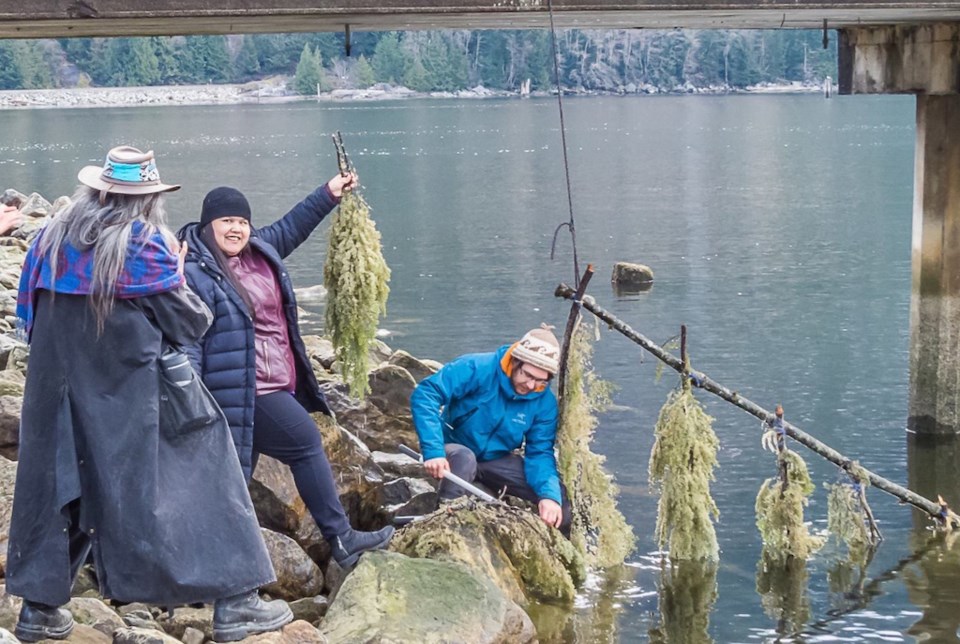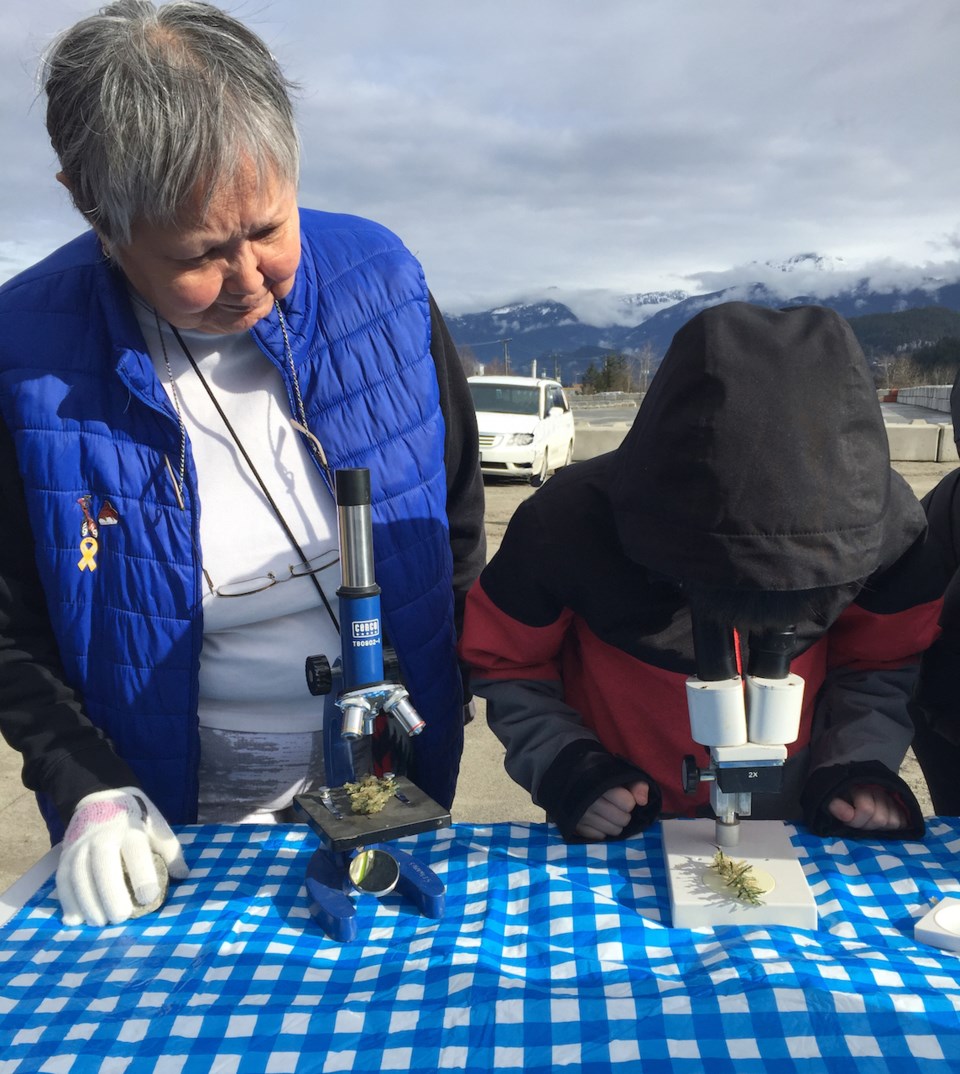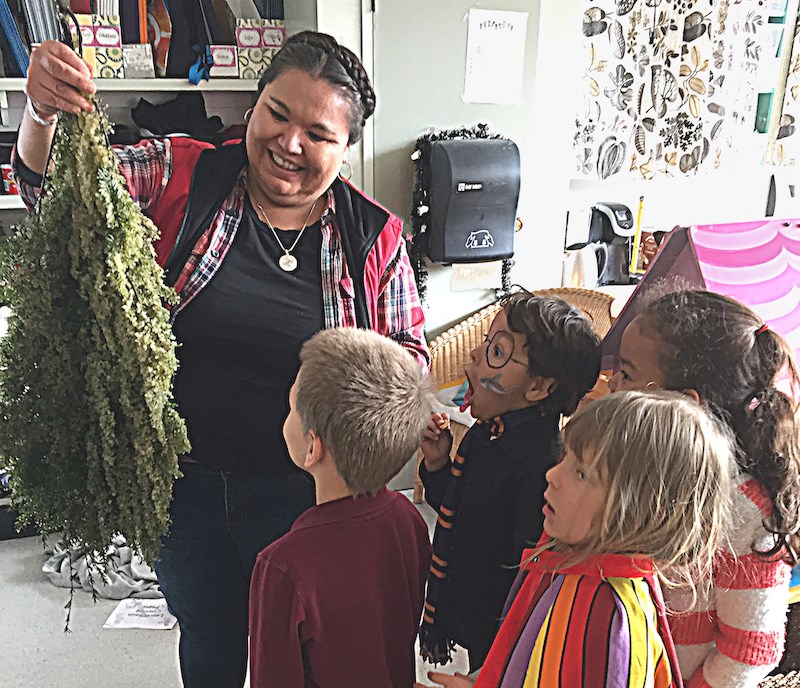A couple of weeks ago, while most of us were carrying on with our daily lives, something special was happening on the shoreline of Atl’Kitsem / Howe Sound.
Across from the Stawamus Chief at Newport Beach in Squamish, young students, elders, respected community members and teachers, stood in circle, sang songs of gratitude, spoke words about the importance of the occasion: the great privilege that the people present were about to experience.
Moments later, for the first time in a hundred years, hemlock boughs covered with herring roe were pulled from the waters of Atl’Kitsem.
The Squamish Nation were harvesting herring roe - Ch’em’esh - within their territory, using traditional fishing techniques, revived after this knowledge was lost from the community.

This journey started about three weeks ago with an invite from Squamish Nation elders to Cultural Journeys, a public school located at Stawamus at the foot of the Chief. The elders wanted to work together with students on harvesting herring roe.
“Herring and their eggs were an integral part of our traditional diet. The Skwxwu7mesh word for March is ‘Temlhawt’, meaning Herring Time,” Charlene Williams explained.
Charlene Williams, a culture and language worker with Squamish Nation for the school district, extended the invitation to the staff. One of the school’s teachers, Matthew Voost, jumped on it.
“The two of us knew very little about what this project would entail. So it was time to do some research,” Charlene Williams said. “Fortunately one of our elders had experience harvesting in northern waters and was able to share some knowledge. Books that detailed the history of herring fishing by the Squamish Nation were consulted and other First Nations groups generously shared their expertise.”
“Armed with this new knowledge, we set about teaching our students. They learned about the life cycle of the herring, their importance in the ecosystem, and the Skwxwu7mesh traditional ecological knowledge that was used to harvest Herring Roe,” she said.
Due to the industrial pollution from the Britannia Mine, Woodfibre Pulp Mill, Nexen Chlor-Alkali plant and local logging, it had been unsafe for the Squamish people to harvest seafood in Atl’Kitsem and other colonial policies prevented harvesting too.
“We were prohibited from accessing the ancient trade economy we had with our neighbours,” Charlene Williams shared. “Canadian law forbade us to freely leave reserves and forced children into residential schools and explicitly prohibited fishing and other cultural practices. The combination of these factors led to a loss of knowledge in our community.”
For far too long the herring didn’t spawn. But that recently changed.
“Since 2011, we have seen reports by John Buchanan of herring spawning in our traditional territories. We felt it safe to harvest herring roe this year,” said Charlene Williams.

Next, kindergarten to grade four students and their teachers put their new learned knowledge into practice. Hemlock boughs were collected in preparation. A week before the harvest, elders, teachers and students gathered at Newport beach, sang a song of gratitude, and started the work.
“Elders and students tied the hemlock boughs to large maple poles and to rocks to anchor them,” Charlene Williams explained. “The complete mechanism was carried by elders, students and community members to the dock while traditional songs to honour the occasion were sung. There it was sunk into the ocean while the students cheered on. We set off to wait out the week, hoping our hard work would pay off.”
It did!
Grade 6 students helped pull the boughs up. Some of the Ch’em’esh was eaten fresh on the spot. The rest taken to the school, where it was rinsed. Fresh Ch’em’esh was brought to the homes of the elders. The rest was saved to be dried, frozen, or smoked, and shared at upcoming potlatches.
“The rejuvenation and rehabilitation of Atl’Kitsem brings with it a rejuvenation of our culture and ancient teachings,” Charlene Williams concluded. “This in large part to the rehabilitation efforts of amazing groups such as the Squamish River Watershed Society.
“Chen kwen mantumiyap, an ha7lh ten skwalwen. Na m’i kanatsut ta slhawt ey ta ch’em’esh.
“I am thankful and it is very good in my heart that the herring have returned with the herring eggs.




